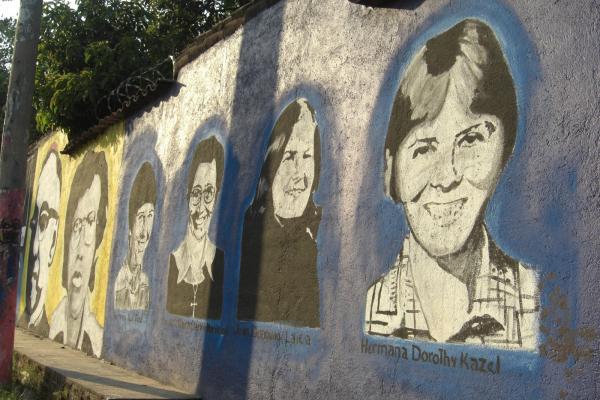This cup is the new covenant in my blood. Do this as often as you drink it in remembrance of me (1 Corinthians 11:25).
Maura, Ita, Dorothy, and Jean -- who were tortured and assassinated in El Salvador on December 2, 1980 -- are present among communities of faith throughout the world. Today they are remembered as martyrs. The psychological, political, and spiritual analyses have given way to the stark reality of four women who loved the people of El Salvador and were willing to accompany them in times of great suffering; and to the stark reality of four women who, because they lived as disciples of Jesus of Nazareth, came face to face with the power of evil in its ultimate manifestation of violent death.
That they are remembered as martyrs, or "witnesses," is due to the fact that there exist today Christians and Christian communities who receive and interpret their witness in the living tradition of Jesus the Christ.
Reflecting on the many experiences related to the deaths of Jean, Dorothy, Maura, and Ita, I discover three key elements: 1) the unmasking of evil, 2) the discipleship of the four women, and 3) the vitality of faith today.
The Unmasking of Evil
The Biblical experiences and descriptions of evil have been updated and surpassed as we approach the third millennium. The deaths of the four women make it clear that there are people today who fulfill the words of the psalmist:
In arrogance they hotly pursue thepoor; [their] mouths are filled with cursing and deceit and oppression; under their tongues are mischief and iniquity; who sit in ambush in villages; in hiding places they murder the innocent; their eyes stealthily watch for the hapless, they lurk in secret like a lion in its covert; they lurk that they may seize the poor when they draw them into their web (Psalm 10:7-9).
Today the technological means at their disposal take the doing of evil beyond the imagination of most of us.
The events surrounding December 2, 1980, revealed to the U.S. public that the deaths of the women were not an accident; that torture, disappearance, and death were daily events for the people of El Salvador (now 75,000 civilian deaths since 1978). The repressive government of El Salvador, in the persons of five low-ranking soldiers, was found guilty of the deaths. This was not the unmasking of evil.
Evil was unmasked and found to be the intransigence of the U.S. government's support of the Salvadoran regime. The initiative taken by top officials in the U.S. government to disguise and justify the crime by blaming the victims was shocking to me. I realized that truth was determined by whatever complied with, and enhanced, U.S. policy.
On March 18, 1981, then-Secretary of State Alexander Haig discussed the question of Jean Donovan's death with her father's representative in Congress, Dante Fascell: "I would like to suggest to you that some of the investigation would lead one to believe that perhaps the vehicle the nuns were riding in may have tried to run a roadblock ... and there may have been an exchange of gunfire. And perhaps those who inflicted the casualties sought to cover it up."
On Christmas Day 1980, the Tampa Tribune published an interview with then-U.N. Ambassador-designate Jeane Kirkpatrick, who had this to say: "The nuns were not just nuns. The nuns were also political activists. We ought to be a little more clear about this than we actually are. They were political activists on behalf of the Frente [guerrillas], and somebody who is using violence to oppose the Frente killed these nuns."
During the 10 years following the assassination, I found that biblical history and wisdom clearly identify the basic operating principles of the evil-doer: deceit and lies in service of power. The structure that emerges historically and becomes symbolic of evil in biblical literature is that of the empire. The cunning of the empire is described in apocalyptic language in the book of Revelation. Wisdom and courage are required in the identification of evil because the deceit and strength of the evildoer are great (Revelation 13).
The expansion of empires is facilitated by those national leaders who turn against their own people in order to rule and maintain their prestige and economic status. They actively collaborate with the empire.
In biblical times the rulers of Israel frequently sought salvation by making alliances with foreign powers. One example from the time of Jesus is the Herodians who allied themselves with the Roman Empire. Having lived in Central America for 18 years, I have seen that the active collaboration of government leaders and national oligarchies with U.S. policies of economic and military aggression cause them inconveniences, but the real impact of U.S. policy is in the devastation of the poor.
Why then is it so difficult to unmask evil? The very nature of evil is to deceive. I agree with those analysts who say that the real war in Central America today is being waged on the battlefields of the minds and hearts of the campesinos.
The flag that is being waved is "democracy." People hungry and tired of war long for peace. "Democracy" offers a relief -- "peace." People get out to vote, led to believe that this is all of democracy and that violence will cease and the economy will be revived.
What actually happens is that the presidents elected are subservient to the United States. The popular movements are squelched and the economic sanctions are lifted, but there is stricter adherence to IMF (International Monetary Fund) structural adjustments (fewer public services in order to pay the external debt), and the economies are denationalized as they are assimilated into neo-liberal capitalism.
Biblical faith came to be in historical experiences which are similar to those of today. The God of the Covenant with biblical Israel is the God who hears the cry of the poor and who acts in history. One of the reasons that the memory of Exodus is dangerous is that the poor, the slaves, not only escape but in the process break the economic structure of the Pharaoh.
In the last book of the Bible we have revealed to us that the unmasking of the powers of evil in the Roman Empire becomes a source of hope to the persecuted Christian communities. The clarity and strength of faith in the God of life is experienced as victorious in the crucified and risen Jesus.
The Discipleship of Four Women
JEAN, DOROTHY, MAURA, AND ITA were disciples of Jesus of Nazareth and believers in Jesus the Christ, the risen one, the savior. Is this why they died? Yes. Christian faith is the doing and living of God's Covenant with humankind in the biblical tradition. Pablo Richard, a Chilean Catholic theologian, wrote:
Sociologically speaking, the Bible is the only book written from the experience of the poor. History is usually written from the perspective of the powerful, the empire. The biblical Israel was destroyed but the people of God continue to live in their historical memory, which Jesus brings to triumph in his death and resurrection. Today this memory continues.
The four women were in El Salvador to accompany and walk with the poor. They were in El Salvador as members of a church that is persecuted because it is identified with the cause of the poor. The lives and deaths of the women in solidarity with the lives and deaths of the poor in El Salvador bring into sharp focus the living memory of the crucified and risen Jesus.
The death of Jesus was experienced and interpreted differently by the Sadducees, priests, scribes, Pharisees, and disciples. They were all religious people. Historically there have been religious traditions that water down and distort the energy and drama of the gospel. Within the churches today, similar tendencies are present: to spiritualize and individualize the gospel; to legalize and ritualize the gospel; to moralize and doctrinalize the gospel. In the gospel according to Mark, we are presented with a clear pattern of discipleship. John the Baptist calls the people to conversion and preparation for the coming of the reign of God. In the process he becomes the enemy of Herod and is beheaded.
Jesus announces the reign of God and goes about doing good. He becomes the enemy of the religious and political leaders, because he identifies them as the oppressors of the people and as those who distort the living memory of the people of God for their own benefit (Mark 10-12). Jesus is crucified. His disciples are presented as followers who do not understand this pattern of discipleship (Mark 8:24-38; 9:30-37; 10:32-45).
Small wonder then that those of the 20th century had difficulty understanding what discipleship means. The death and resurrection of Jesus have been disincarnated and desocialized to the extent that the discipleship of Ita, Maura, Jean, and Dorothy are incomprehensible to many Christians today.
The Vitality of Faith Today
THE HISTORY OF THE EARLY CHURCH demonstrates that the disciples in time did come to comprehend the life, death, and resurrection of Jesus. For nearly 300 years, the church was persecuted, until it accommodated itself to the empire. In spite of the rise and fall of many empires, and in spite of the church accommodating itself within these empires, there have always been communities who receive the witness of Jesus and his followers with that clarity and energy of faith that transforms them into living witnesses themselves.
One recent example was the persecuted Christian communities in El Salvador. Another example is the prophetic communities within the empire of the United States that recognize and denounce evil, defend the cause of the poor, and receive the witness of today's martyrs.
December 2 is the anniversary of the deaths of the four women. Those who have coordinated commemorations have told me that every year more and more people throughout the United States reverence and celebrate this day publicly. In a spirit of hope, I understand these celebrations as a sign of faithful response to Jesus' proclamation of the gospel of God: "The time is fulfilled, and the reign of God is at hand; repent and believe in the gospel" (Mark 1:15).
May all of us who commemorate the life, death, and resurrection of Jesus in the lives and deaths of Dorothy, Jean, Ita, and Maura be transformed into faithful witnesses of the God of life who "makes all things new" (Revelation 21:5).
Melinda Roper, M.M., was president of Maryknoll Sisters at the time of the deaths of the four church women. To her fell the difficult tasks of informing the families, comforting her community of sisters, interpreting the witness of the four women to the media, and pressing the State Department and Congress for an investigation of the murders. She had served as a missionary in Central America for 18 years and lived in rural Panama when this article appeared.

Got something to say about what you're reading? We value your feedback!
